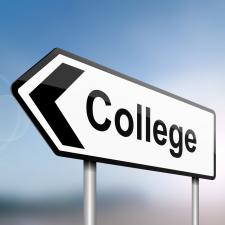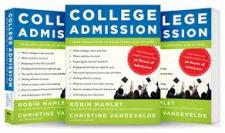Wish us Happy Anniversary and Win a Free Copy of College Admission
Posted on Tue, 08/27/2013 - 09:17
We're two!


We're two!
As you receive news from the colleges to which you've applied, there can be a lot of noise -- and interference. Inquiring minds want to know if you’ve heard from the colleges, what you heard from the colleges, where you will be going to college. Oh, and how about your friends, the class president, the quarterback, and the kid down the street? Some of this is genuine interest in you and some of it is nosiness and the rest is thinly veiled status competition.
When we wrote our book, we asked Rosalind Wiseman, author of Queen Bees and Wannabes— the inspiration for the hit movie Mean Girls— and an expert on teens and parenting, for her advice about talking the talk during this step in the college admission process. Here's here advice -- including some very useful sound bites:

When visiting a college, admission officers are the best resources for answers to specific questions about the application process, a college’s mission and future plans, and most aspects of daily life on campus— academics, housing, special programs such as study- abroad opportunities, and athletics. But sometimes you get the most information with broader questions about the who, what, and why of the campus. Here are some questions that you may want to ask during an information session or group interview:
• What impresses you the most in a student’s application?
• What are you looking for when you read students’ essays?
• What are some of the things you hate to see in an application?
• Is demonstrated interest a factor in your admission decision?
• What kind of student does well here? What kind of student doesn’t do well here?
• Did you attend this college? What has changed since you’ve been here?
• What are recent alumni doing?
• What do you think your school is best known for?
• How would you describe the typical student here?

Meet with your counselor to plan your senior-year coursework. A fourth year of math and a laboratory science as well as a fourth year of science are highly recommended. And if your school does not offer an AP, IB or other advanced curriculum, consider dual enrollment -- enrolling in a course at a local community college or university. You should be challenging yourself to signal to colleges that you are likely to succeed if admitted. "Academic ability is the ante to get into the game," says Katharine Harrington, Vice President of Admissions and Planning at University of Southern California.
For more information about a recommended course of study and the role of the academic record in admissions, see Chapter 5, "The Academic Record," and Appendix II, "A Recommended Course of Study," in College Admission: From Application to Acceptance, Step by Step.

Last week, we posted the objective guidebooks that we recommend as you research the colleges for your initial list of schools. For this week, here are the subjective guidebooks we recommend. These books provide basic information about schools, including information on acceptance rates, cost and enrollment. But they also "review" colleges and universities the way critics review movies. Using feedback and input from students, faculty, alumni, high school college counselors and others, the information in these books weaves fact and opinion about the student body, athletics, academics, social life, physical setting, dorms and other aspects of campus life.
The books listed here are available in most bookstores, public libraries and the office of your high school college or guidance counselors. Websites are available to everyone free of charge.
Books
The Best 371 Colleges, Princeton Review
Big Book of Colleges, College Prowler

Don't forget to regularly check Resources under the Book tab here on the site. We're constantly updating and adding books and websites for navigating the college application and admission process. What's more, these resources have been recommended by deans of admission and college counselors and vetted by us. We know there's lots of bad information out there, so we're very particular about who makes the list. Recent additions include information for students with learning differences -- http://www.ahead.org/ and http://www.ncld.org/; for athletes -- http://www.playnaia.org/; and for scholarships -- http://scholarshipedia.org/.

Thank you to School Library Journal for featuring College Admission: From Application to Acceptance, Step by Step in their roundup of college guides -- The College Maze | From Application to Admission (And Beyond).

Thank you to Christopher Briggs, Assistant Director of Undergraduate Admission, Georgia Institute of Technology, for the excellent review of College Admission: From Application to Acceptance, Step by Step for the National Association for College Admission Counseling (NACAC). We love it when reviewers "get" the book --especially professionals in the field! You can read the review in its entirety here.
College Admission has a new look for the new school year!
We've redesigned the CollegeAdmissionBook.com website to make it easier for you to get our expert, comprehensive and compassionate advice on the college admission process.
Our blog is now called True Admissions. It's simpler than ever to navigate through our daily updates and our continuing series of Five Questions for the Dean and the Counselor of the Month.
Our ever-expanding Gourmet Guide for your college road trip is now conveniently laid out state by state and college by college.
Our new online home better reflects who we are -- a book, an online community, and speaker events. Use the navigation panels on the right of every page, and the drop-down menus at the top of every page to explore.
And let us know if there's something else you'd like to see here at College Admission. We're always fine-tuning and would love to hear your suggestions!
Visit our Facebook page to follow coauthor Robin Mamlet's five-city book tour of China. In today's pictures, Robin visits the Nanjing Confucian Temple. She writes: Confucius promoted education and the temple in Nanjing is famous for having been the largest test site in all of China. An incredibly taxing exam was given nationally and the best in each province were selected to come to Nanjing for another even more difficult test. The test site at the Nanjing Temple accommodated 10,000 -- selected from all of China to take the highest level of exam. Only men were allowed to take the exam! And only 30 to 50 could be chosen from the 10,000 to go on and become a government official,a position considered the most prestigious in the land. Talk about selective! Within the temple, there is a "wishing wall.". On the wall, people hang their "wish cards," or jin bang ti ming ka. You can wish for whatever you like, for yourself or - more often - your son or daughter: high scores on gao kao, the Chinese national exam that determines placement in the top Chinese universities, or to get into a top college, for example. Last night there were thousands of jin bang ti ming ka up because at 10p.m. the Nanjing gao kao results were being released. Above is a wish card. See more at our Facebook page here.